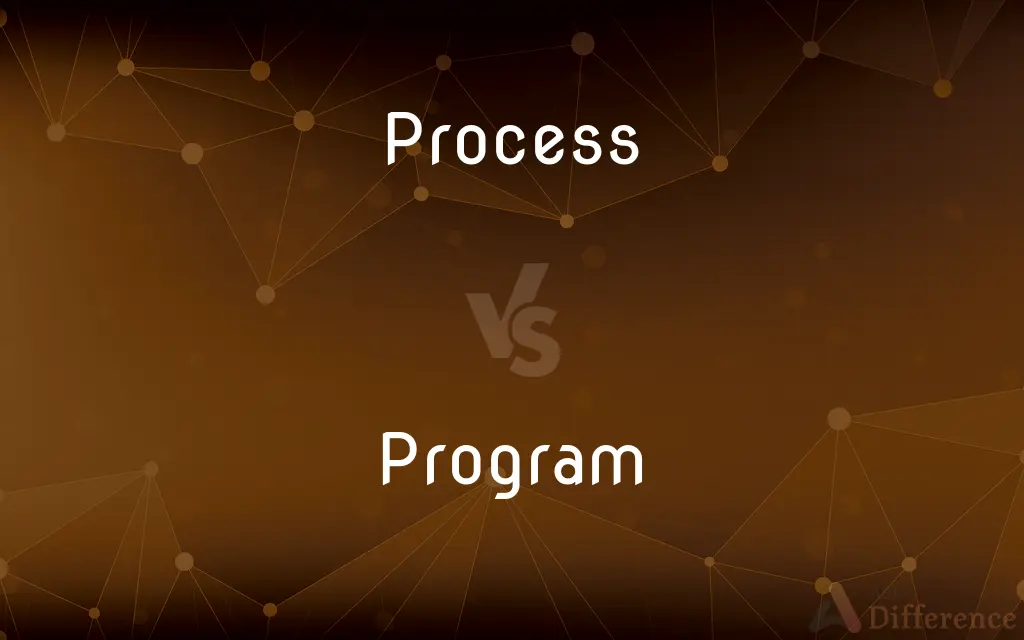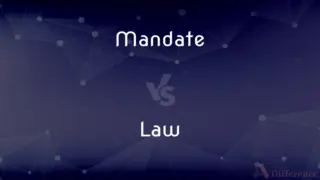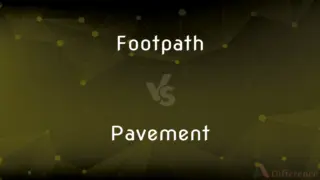Process vs. Program — What's the Difference?
By Maham Liaqat & Urooj Arif — Updated on March 30, 2024
A process is a series of actions or steps taken to achieve a particular end, often specific and task-oriented, while a program is a broader set of projects or activities designed to meet a long-term goal or objective.

Difference Between Process and Program
Table of Contents
ADVERTISEMENT
Key Differences
A process is a sequence of tasks or operations carried out to accomplish a specific objective, typically within a defined timeframe. It emphasizes efficiency, effectiveness, and consistency in achieving its outcomes. Processes can be found in various contexts, from manufacturing to software development, where they outline the steps needed to create a product or deliver a service. In contrast, a program encompasses a wider range of coordinated activities, projects, and processes aimed at achieving a strategic objective or addressing a significant issue over a longer period. Programs are often composed of several interconnected projects, each contributing to the overarching goal, and require management of resources, stakeholders, and timelines across these projects.
Processes are generally more rigid and structured, with a clear sequence of actions that must be followed to ensure the desired outcome. They focus on the "how" aspect of achieving tasks, ensuring that operations are conducted efficiently and effectively. Programs, however, offer more flexibility in terms of execution, focusing on the "what" and "why" — what needs to be achieved and why it is important. This allows for adjustments and realignments based on progress, outcomes, and changing external conditions.
The success of a process is measured by its efficiency, quality of output, and adherence to the specified steps, whereas the success of a program is evaluated based on its ability to achieve its strategic objectives, impact, and benefits realization. While processes are typically managed by process owners or managers focused on operational excellence, programs require program managers or directors who oversee the strategic direction, integration of projects, and stakeholder engagement.
The key distinction lies in their scope and focus: processes are task-oriented, focusing on the efficient execution of specific activities, while programs are goal-oriented, focusing on achieving broader strategic objectives through the coordination of multiple projects and activities.
Comparison Chart
Definition
Sequence of actions to achieve a specific task.
Set of related projects aimed at a strategic goal.
ADVERTISEMENT
Scope
Specific, narrow
Broad, strategic
Focus
Efficiency and effectiveness of tasks
Achieving long-term objectives
Flexibility
Structured and sequential
Adaptable to changes in strategy or objectives
Measurement of Success
Efficiency, quality of output
Strategic objective achievement, impact
Management
Process owners, managers
Program managers, directors
Example
Manufacturing process, software development process
Environmental conservation program, educational program
Compare with Definitions
Process
A sequence of steps designed to accomplish a specific task.
The recruitment process includes screening, interviewing, and hiring.
Program
A coordinated set of projects aimed at achieving a major goal.
A health and wellness program focuses on improving community health.
Process
Has a defined beginning and end.
The process of baking bread begins with mixing ingredients and ends with baking.
Program
Involves strategic planning and management.
The program for renewable energy development includes various projects like wind and solar power installation.
Process
Can be standardized or customized.
The customer service process is standardized to ensure consistency across interactions.
Program
Flexible and adaptable to changes.
An educational program may evolve based on new learning methodologies.
Process
Involves monitoring and control to ensure quality.
The quality control process ensures products meet certain standards.
Program
Requires integration of different projects and resources.
The urban development program integrates housing, transportation, and infrastructure projects.
Process
Focused on operational efficiency.
The assembly line process is optimized for maximum productivity.
Program
Measured by its overall impact and benefits.
The success of a conservation program is measured by the increase in biodiversity and habitat restoration.
Process
A series of actions, changes, or functions bringing about a result
The process of digestion.
The process of obtaining a driver's license.
Program
A listing of the order of events and other pertinent information for a public presentation.
Process
A series of operations performed in the making or treatment of a product
A manufacturing process.
Leather dyed during the tanning process.
Program
The presentation itself
A program of piano pieces.
Process
Progress; passage
The process of time.
Events now in process.
Program
A scheduled radio or television show.
Process
The use of the law courts and other fora as a means of seeking redress
The adversarial process.
Due process of law.
Program
An ordered list of events to take place or procedures to be followed; a schedule
A program of physical therapy for a convalescent.
Process
The set of actions and events that constitute a legal proceeding or a significant portion thereof
The trial process.
The sentencing process.
Program
A system of services, opportunities, or projects, usually designed to meet a social need
"Working parents rely on the center's after-school latchkey program" (New York Times).
Process
(Law) A means of compelling a person to appear in court, especially a summons ordering a defendant to appear in court.
Program
A course of academic study; a curriculum.
Process
(Biology) An outgrowth of tissue; a projecting part
A bony process.
Program
A plan or system of academic and related or ancillary activities
A work-study program.
Process
Any of various photomechanical or photoengraving methods.
Program
A plan or system of nonacademic extracurricular activities
The football program.
Process
A running software program or other computing operation.
Program
A set of coded instructions that enables a machine, especially a computer, to perform a desired sequence of operations.
Process
A part of a running software program or other computing operation that does a single task.
Program
An instruction sequence in programmed instruction.
Process
See conk3.
Program
All or part of the genetic code of a cell or organism.
Process
To put through the steps of a prescribed procedure
Processing newly arrived immigrants.
Process an order.
Program
A characteristic sequence of developmental or behavioral events in a cell or organism, often considered to result from the expression of genes.
Process
To prepare, treat, or convert by subjecting to a special process
Process ore to obtain minerals.
Program
A stimulus or training sequence that causes an organism to exhibit a behavior, as by conditioning.
Process
(Computers) To perform operations on (data).
Program
To include or schedule in a program
Program a new musical composition.
Process
To gain an understanding or acceptance of; come to terms with
Processed the traumatic event in therapy.
Program
To design a program for; schedule the activities of.
Process
To straighten (hair) by a chemical process; conk.
Program
To provide (a machine) with a set of coded working instructions.
Process
To move along in a procession
"The man in the panama hat offered his arm and ... they processed into the dining room" (Anita Brookner).
Program
To stimulate or train to perform automatically in a specified way
Consumers who have been programmed to buy brand names.
Process
Prepared or converted by a special process
Process cheese.
Program
To prepare an instructional sequence for (material to be taught) in programmed instruction.
Process
Made by or used in any of several photomechanical or photoengraving processes
A process print.
Program
To provide (a cell or organism, for example) with a genetic program
Cells that are programmed to produce insulin.
Process
A series of events which produce a result (the product).
This product of last month's quality standards committee is quite good, even though the process was flawed.
Program
To cause (an effect or action) by means of a genetic program; determine genetically
"The basic housekeeping duties that a human and a yeast cell must perform are the same and are programmed by recognizably similar genes inherited from a common, single-celled ancestor" (Nicholas Wade).
Process
(manufacturing) A set of procedures used to produce a product, most commonly in the food and chemical industries.
Program
A set of structured activities.
Our program for today’s exercise class includes swimming and jogging.
Process
A path of succession of states through which a system passes.
Program
A leaflet listing information about a play, game or other activity.
The program consisted of ads for restaurants and the credits of everyone connected with the play.
Process
(anatomy) Successive physiological responses to keep or restore health.
Program
(politics) A set of principle goals which are supported by a political party or individual candidate
Process
(legal) Documents issued by a court in the course of a lawsuit or action at law, such as a summons, mandate, or writ.
Program
(broadcasting) A performance of a show or other broadcast on radio or television.
Tonight’s program was hosted by Johnny Carson.
Process
(biology) An outgrowth of tissue or cell.
Program
(computing) A software application, or a collection of software applications, designed to perform a specific task.
The program runs on both Linux and Microsoft Windows.
Process
(anatomy) A structure that arises above a surface.
Program
A particular mindset or method of doing things.
Process
(computing) An executable task or program.
Program
(transitive) To enter a program or other instructions into (a computer or other electronic device) to instruct it to do a particular task.
He programmed the DVR to record his favorite show.
Process
The centre mark that players aim at in the game of squails.
Program
(transitive) To develop (software) by writing program code.
I programmed a small game as a demonstration.
Process
(transitive) To perform a particular process on a thing.
Program
(transitive) To put together the schedule of an event.
Mary will program Tuesday’s festivities.
Process
(transitive) To retrieve, store, classify, manipulate, transmit etc. (data, signals, etc.), especially using computer techniques.
We have processed the data using our proven techniques, and have come to the following conclusions.
Program
(broadcasting) To schedule the programming; to determine what will be broadcast.
Process
To think about a piece of information, or a concept, in order to assimilate it, and perhaps accept it in a modified state.
I didn't know she had a criminal record. That will take me a while to process.
Program
(transitive) To cause to automatically behave in a particular way.
The lab rat was programmed to press the lever when the bell rang.
Process
To develop photographic film.
Program
Same as Programme.
Process
To take legal proceedings against.
Program
A system of projects or services intended to meet a public need;
He proposed an elaborate program of public works
Working mothers rely on the day care program
Process
To walk in a procession
Program
A series of steps to be carried out or goals to be accomplished;
They drew up a six-step plan
They discussed plans for a new bond issue
Process
The act of proceeding; continued forward movement; procedure; progress; advance.
The thoughts of men are widened with the process of the suns.
Program
(computer science) a sequence of instructions that a computer can interpret and execute;
The program required several hundred lines of code
Process
A series of actions, motions, or occurrences; progressive act or transaction; continuous operation; normal or actual course or procedure; regular proceeding; as, the process of vegetation or decomposition; a chemical process; processes of nature.
Tell her the process of Antonio's end.
Program
An integrated course of academic studies;
He was admitted to a new program at the university
Process
A statement of events; a narrative.
Program
A radio or television show;
Did you see his program last night?
Process
Any marked prominence or projecting part, especially of a bone; anapophysis.
Program
A performance (or series of performances) at a public presentation;
The program lasted more than two hours
Process
The whole course of proceedings in a cause real or personal, civil or criminal, from the beginning to the end of the suit; strictly, the means used for bringing the defendant into court to answer to the action; - a generic term for writs of the class called judicial.
Program
A document stating the aims and principles of a political party;
Their candidate simply ignored the party platform
They won the election even though they offered no positive program
Process
A particular course of action intended to achieve a result;
The procedure of obtaining a driver's license
It was a process of trial and error
Program
An announcement of the events that will occur as part of a theatrical or sporting event;
You can't tell the players without a program
Process
A sustained phenomenon or one marked by gradual changes through a series of states;
Events now in process
The process of calcification begins later for boys than for girls
Program
Arrange a program of or for;
Program the 80th birthday party
Process
(psychology) the performance of some composite cognitive activity; an operation that affects mental contents;
The process of thinking
The cognitive operation of remembering
Program
Write a computer program
Process
A writ issued by authority of law; usually compels the defendant's attendance in a civil suit; failure to appear results in a default judgment against the defendant
Process
A mental process that you are not directly aware of;
The process of denial
Process
A natural prolongation or projection from a part of an organism either animal or plant;
A bony process
Process
Deal with in a routine way;
I'll handle that one
Process a loan
Process the applicants
Process
Subject to a process or treatment, with the aim of readying for some purpose, improving, or remedying a condition;
Process cheese
Process hair
Treat the water so it can be drunk
Treat the lawn with chemicals
Treat an oil spill
Process
Perform mathematical and logical operations on (data) according to programmed instructions in order to obtain the required information;
The results of the elections were still being processed when he gave his acceptance speech
Process
Institute legal proceedings against; file a suit against;
He was warned that the district attorney would process him
She actioned the company for discrimination
Process
Shape, form, or improve a material;
Work stone into tools
Process iron
Work the metal
Process
Deliver a warrant or summons to someone;
He was processed by the sheriff
Process
March in a procession;
They processed into the dining room
Common Curiosities
How do processes and programs differ in scope?
Processes have a specific, narrow scope focusing on tasks, while programs have a broader scope with strategic, long-term objectives.
What is a program?
A program is a coordinated set of projects or activities aimed at achieving a strategic goal or addressing a major issue over a longer period.
Can a program include multiple processes?
Yes, a program can encompass multiple processes, each contributing to the overall strategic goal of the program.
Who manages processes and programs?
Processes are managed by process owners or managers, focusing on operational tasks, while programs are managed by program managers or directors, focusing on strategic objectives.
What is a process?
A process is a set of defined steps or actions taken to achieve a particular outcome, emphasizing efficiency and effectiveness.
How does flexibility differ between processes and programs?
Processes are more structured and follow a specific sequence, while programs are more flexible, allowing adjustments based on strategic needs.
How do process improvements contribute to program success?
Improving processes can increase efficiency and effectiveness, contributing to the successful achievement of program goals.
How is success measured differently in processes and programs?
Success in processes is measured by efficiency and quality of output, whereas in programs, it's measured by the achievement of strategic objectives and overall impact.
What role do stakeholders play in programs?
Stakeholders are key in programs for providing guidance, resources, and support, ensuring the program aligns with broader objectives and community or organizational needs.
Why is strategic planning important in programs?
Strategic planning is crucial in programs to ensure that all projects and activities are aligned with the overarching goal and can adapt to changes.
How do technological advancements impact processes and programs?
Technological advancements can streamline processes for efficiency and offer new opportunities for program development and implementation.
Can processes operate independently of programs?
Yes, processes can operate independently, focusing on specific tasks, but they can also be part of a broader program to contribute to strategic goals.
What challenges might a program face compared to a process?
Programs may face challenges in coordinating multiple projects, managing changes in strategy, and ensuring all components align with the overall objective.
Can the outcome of a program influence its constituent processes?
Yes, the outcomes and learnings from a program can lead to adjustments in its processes to better meet strategic objectives.
What is the importance of monitoring and evaluation in processes and programs?
Monitoring and evaluation are crucial for assessing the performance of processes and the progress and impact of programs, guiding improvements and strategic decisions.
Share Your Discovery

Previous Comparison
Mandate vs. Law
Next Comparison
Footpath vs. PavementAuthor Spotlight
Written by
Maham LiaqatCo-written by
Urooj ArifUrooj is a skilled content writer at Ask Difference, known for her exceptional ability to simplify complex topics into engaging and informative content. With a passion for research and a flair for clear, concise writing, she consistently delivers articles that resonate with our diverse audience.















































